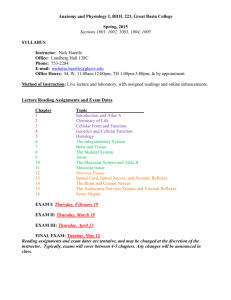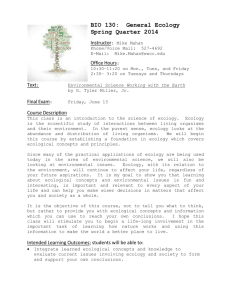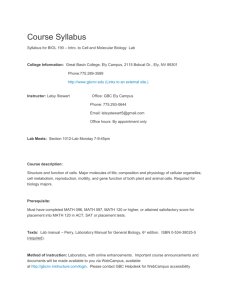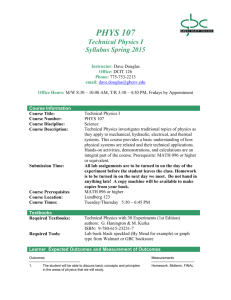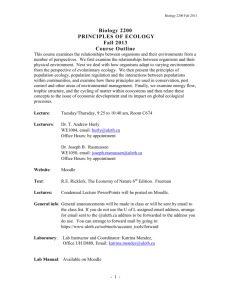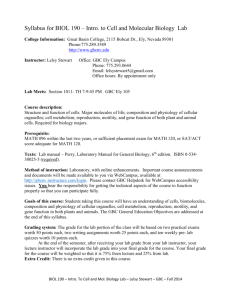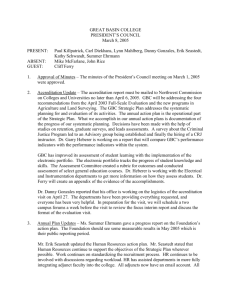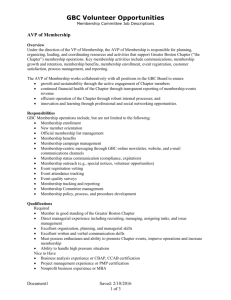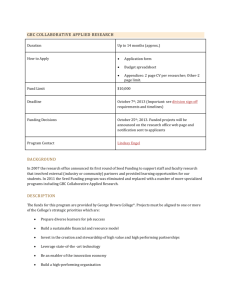BIOL 341 - Great Basin College
advertisement
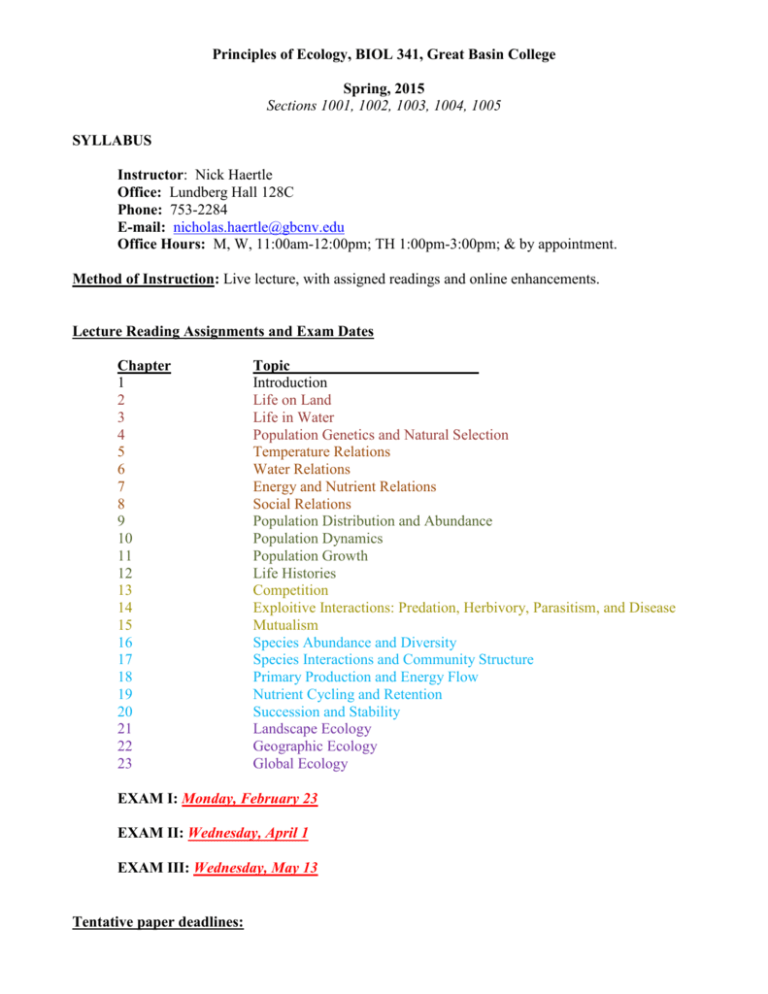
Principles of Ecology, BIOL 341, Great Basin College Spring, 2015 Sections 1001, 1002, 1003, 1004, 1005 SYLLABUS Instructor: Nick Haertle Office: Lundberg Hall 128C Phone: 753-2284 E-mail: nicholas.haertle@gbcnv.edu Office Hours: M, W, 11:00am-12:00pm; TH 1:00pm-3:00pm; & by appointment. Method of Instruction: Live lecture, with assigned readings and online enhancements. Lecture Reading Assignments and Exam Dates Chapter 1 2 3 4 5 6 7 8 9 10 11 12 13 14 15 16 17 18 19 20 21 22 23 Topic Introduction Life on Land Life in Water Population Genetics and Natural Selection Temperature Relations Water Relations Energy and Nutrient Relations Social Relations Population Distribution and Abundance Population Dynamics Population Growth Life Histories Competition Exploitive Interactions: Predation, Herbivory, Parasitism, and Disease Mutualism Species Abundance and Diversity Species Interactions and Community Structure Primary Production and Energy Flow Nutrient Cycling and Retention Succession and Stability Landscape Ecology Geographic Ecology Global Ecology EXAM I: Monday, February 23 EXAM II: Wednesday, April 1 EXAM III: Wednesday, May 13 Tentative paper deadlines: Topic approval Outline Rough draft Final draft Monday, March 2 Wednesday, March 18 Wednesday, April 15 Monday, May 6 Reading assignments and exam dates are tentative, and may be changed at the discretion of the instructor. Typically, exams will cover between 6-8 chapters. Any changes will be announced in class. Required Texts: Ecology: Concepts and Applications. 6th Edition by Manuel C. Molles Jr. ISBN: 9780073532493 Grading System and Policies: Grades will be based on three non-comprehensive, short answer exams (20% each), one research paper (20%), class presentations (10%), and class participation (10%). Details of the writing assignment and presentation will be discussed in class. Quizzes and other assignments may be administered at MY DISCRETION. 90 - 100% = A 80 - 89% = B 70 - 79% = C 60 - 69% = D < 60% = F Note: By GBC policy, I can no longer issue a grade of “W” or withdrawal. Be advised that the last date for a student to withdraw from a course is 23 March (up to you to double check and keep up to date). All exams will be held on the dates listed in the syllabus. Any changes to that schedule will be announced in class well in advance. Missing an exam due to personal reasons or illness must be approved in advance if possible, or by contacting me within 24 hours of the exam in the case of emergency. Make up exams will be allowed and scheduled at my discretion. Attendance will not be taken, but be advised: Regular attendance is the single most important thing you can do to get and maintain a good grade. Web Sites Used in This Course: Two web sites will be used in this course, GBC’s own MyGBC, and WebCampus. The online access with your textbook may be useful also. MyGBC: I will be using the email lists at MyGBC for announcements. Please make sure that your email address at MyGBC is both current and one that you check regularly. WebCampus: I will be using WebCampus in lecture sparingly. However, I may start using it more as the semester progresses. For the time being, do not contact me through WebCampus. If you need to contact me use my regular email or phone listed on the first page. To log into WebCampus, go to: https://gbcnv.instructure.com/login Your WebCampus ID is your Great Basin College email address ID. If you don't have a GBC email address or don't remember your address go to swami.scsr.nevada.edu or the Technology Help Desk helpdesk@gwmail.gbcnv.edu, or 753-2167. Passwords will be sent by mail to students who register for their course(s) 5 days before the semester begins. If you register after this time or did not receive a letter by mail, contact the Help Desk as soon as possible. Miscellaneous Policies: Americans with Disabilities Act (ADA) Statement: GBC supports providing equal access for students with disabilities. An advisor is available to discuss appropriate accommodations with students. Please contact the ADA Officer (Julie Byrnes) at 775-753-2271 at your earliest convenience to request timely and appropriate accommodations. Academic Honesty Statement: Great Basin College considers academic honesty one of its highest values. A student who obtains academic credit for work that is not the product of his or her own effort is being dishonest and undermining the academic integrity of the college. Students are expected to be the sole authors of their work. Use of another’s ideas must be accompanied by specific citation and reference. In addition, a learner may not submit the same work for credit in more than one course. The disciplinary consequences of plagiarism and other forms of academic dishonesty include nonacceptance of work submitted, a failing grade in the course, and/or or other disciplinary action as outlined in Great Basin College’s Student Conduct Policy. Cell Phone Policy: Cell phones must be turned off or to vibrate before class and left off during class. Neither phoning nor text messaging is permitted. Campus Security: GBC is committed to the safety of our students and has a duty to promote awareness and prevention programs for violence on campus under the Jeanne Clery Act as well as the Campus SaVE (Sexual Violence Elimination Act) and VAWA (Violence Against Women Act), which are amendments to Clery. Acts of violence include, but are not limited to, sexual assault, domestic violence, dating violence, and stalking. Acts of violence can occur on the physical campus or centers of GBC in addition to field placement sites, clinical practice settings, and other places where college or class activities occur. As well, the online environment at GBC is considered a GBC site. If you experience any incidence where your safety has been threatened or violated, or if you feel threatened or harassed, immediately report this to me, any center director, faculty, or staff member, or directly to the Director of Environmental Health, Safety & Security(775.753.2115) or the Vice President for Student Services(775.753.2282). This syllabus does not in any way represent a contract. It is a reflection of the intent of the instructor, but do recognize that it is an organic construct that may change as the semester progresses. Any changes will be announced in class. Catalog Description: BIOL 341 Principles of Ecology (3) The fundamentals of ecology studied at the levels of population, community, and ecosystems. Prerequisite: Must have completed BIOL 190 and STAT 152 STUDENT OUTCOMES Outcome Measurement of this outcome (assessment devices listed) STUDENTS WILL HAVE AN UNDERSTANDING OF PRINCIPAL ECOLOGICAL PRINCIPALS. EXAMS STUDENTS WILL BE ABLE TO UNDERSTAND AND EXAMS, CLASS PARTICIPATION DESCRIBE CURRENT ECOLOGICAL ISSUES AND PROBLEMS AT THE ORGANISMAL, POPULATION, COMMUNITY, AND ECOSYSTEM LEVEL STUDENTS WILL UNDERSTAND QUALITATIVE AND QUANTITATIVE METHODOLOGIES CLASSICALLY EXAMS USED TO ANSWER FUNDAMENTAL ECOLOGICAL QUESTIONS STUDENTS WILL BE ABLE TO APPLY KNOWLEDGE EXAMS OF GENERAL ECOLOGICAL PRINCIPALS AND METHODS STUDENTS WILL BE ABLE TO PERFORM LITERARY RESEARCH PAPER RESEARCH AND WRITE ON AN CHOSEN ECOLOGICAL TOPIC RESEARCH PRESENTATION, RESEARCH PAPER STUDENTS WILL BE ABLE TO DESIGN AND DELIVER AN ORAL PRESENTATION IN A PUBLIC SETTING BASED ON A CHOSEN ECOLOGICAL TOPIC STUDENTS WILL SHOW PROFICIENCY IN THE USE OF ECOLOGICAL TERMINOLOGY. EXAMS
